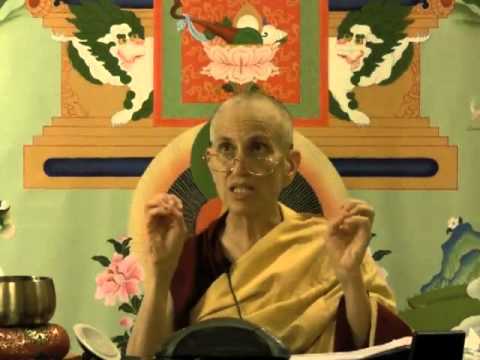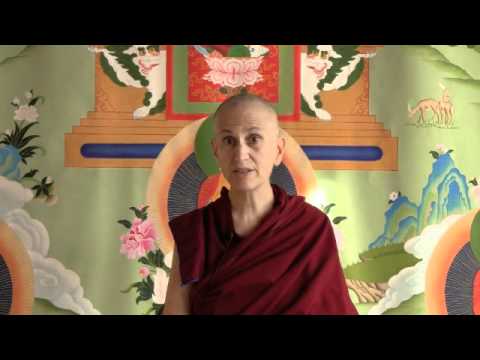Benefits of reciting verses
This talk was given during the White Tara Winter Retreat at Sravasti Abbey.
- The benefit of reciting mantra, prayers, and verses
- How recitations should be done with mindfulness
- Misconceptions of doing recitations
White Tara Retreat 12.1: Q&A Benefits of reciting verses (download)
Okay, so I just want to talk a little bit about some other questions that the retreatants from afar have asked. And also to ask the retreatants from afar—you know, sometimes I can’t answer all of your questions, so please excuse me. Sometimes I feel that the topic isn’t of interest to everybody or it’s too detailed or something like that.
So somebody said that there’s a verse in the Song of Longing for Tara, that we have now put up on the website. It’s also in the book How to Free Your Mind, which I really recommend to people to get help with the retreat from afar because it talks a lot about Tara. Well, the book is about Tara. Mostly Green Tara, but it applies to White Tara, too.
So, it’s a very beautiful song of longing that was written. So there’s one verse at the end that talks about the benefits of reciting it, and it says: “If for as long as you live you recite this prayer three times every day—not just from the mouth (in other words, not just by words only), but strongly linked with your mind—you will have a close connection and will see Tara’s face. No hindrances will be experienced and all wishes will be fulfilled. You will have a close relationship with all Buddhas and bodhisattvas and they will hold you dear. If you recite the Homage to the 21 Taras and this prayer you will attain the divine liberating mother.”
So somebody writes and says: “I like this song very much, but I can’t understand why we will attain the results. What kind of reasons would there be for why we would attain these results?
So, initially you read this is sounds like, “Okay, if you just recite this prayer three times a day—it says ‘not from the mouth, but strongly linked from your mind,’ but you know I just recite it, blah blah blah…” You know, we think that counts for it? No.
Okay, this is talking about somebody who has incredible devotion to Tara based on understanding the Gradual Path. And so has some experience in renunciation and bodhicitta and the wisdom realizing emptiness, so much so that when they say this they’re really with the prayer, completely, all the time, experiencing it, seeing Tara as appearing but also empty of true existence. Somebody like this will get those kinds of results because they’ve completed so many areas, or other aspects, of the path.
But somebody like us, who just kind of recites the prayer and it’s more on our mouth, because we get spaced out when we’re doing it. And you know, “Who wants to do it three times a day, I already said it once…” You know, “It’s boring, I don’t want to do it three times a day.” You can see that with our attitude we’re not going to get that kind of result.
And so also, it doesn’t mean that just for one day you’re reciting it so intently like this and you get this result. It’s really talking about your overall Dharma disposition and level of accomplishment.
So the same thing holds true when they say— Well, sometimes you’ll hear what His Holiness calls propoganda for reciting mantra. Like, “If you recite this mantra once you will never be reborn in the hell realms.” You know, you hear that about certain mantras. And His Holiness says that, you know, if we take that literally then there would be no need for the Buddha to teach all the 84,000 Dharmas that he did. Because all he would have taught us is to recite that one mantra, and then no more lower rebirths. So he says a lot of these things that talk about very extraordinary things happening just from doing something once or a few times… He said that’s taught to encourage people but you shouldn’t take it literally.
And so similarly with reciting the Homage to Amitabha, you know? In some scriptures it says if you recite this ten times when you’re dying then you’ll go straight to Amitabha’s pure land. Well, you know, I don’t think it’s exactly like that, because if you spent your whole life living in non-virtue it’s not going to be at the end of your life you say this and that’s going to overpower all your non-virtue. And in any case, somebody who’s lived his whole life very habituated with non-virtue is not going to think to recite “namo amituofo” when they’re dying. You know? And so when you really read the commentaries written by the great Chinese masters about this practice, they talk about the other things that you need to fulfill to really ensure that you’re reborn in Amitabha’s pure land. And they talk about how there’s an external pure land, and then there’s the internal pure land that you access through your realizations of samatha and vipassana—serenity and insight.
So a lot of these things, you know, in general are said to encourage us, but we don’t— We shouldn’t necessarily take every single one literally. And even if we do look at it literally, see if we actually have the qualifications to do what it says on that. Like even reciting the “Praises to Tara” every day— You know, it says if you do it three times every day then if you want a child you’ll have one— This refers not only to biological children, but if you want to have somebody to carry on your Dharma transmission, you know? But all these things that can come from it. But then you have to recite that with real earnestness and with real Dharma understanding, and over a period of time, and work out a lot of other issues. It’s not just kind of reciting something in a distracted way, the way we tend to.
But, having said that, that doesn’t mean that we shouldn’t recite things, just because we’re distracted. Because how are we ever going to develop concentration if we don’t start doing the practice when we’re distracted? If we just say, “Well, I’m so distracted, there’s no use doing it,” that’s wrong. Okay? Because, how are you going to develop concentration if you don’t start doing the practice? And of course when you start doing it you’re going to be distracted. That’s normal. So we’ve got to start somewhere, and we’ve got to keep practicing. But we should practice with a lot of love and a lot of enthusiasm, and let the results kind of unfold in a very natural way. Instead of tapping our foot and crossing our arms and saying, “You know, I recited this three times, and you know, Tara, what’s the story? You haven’t come through for me.” And then we should check our belief system, are we conflating Tara with our idea of some omnipotent god. Are we really having the correct idea of Tara. Because if we don’t, then hard for those benefits to arrive.
Venerable Thubten Chodron
Venerable Chodron emphasizes the practical application of Buddha’s teachings in our daily lives and is especially skilled at explaining them in ways easily understood and practiced by Westerners. She is well known for her warm, humorous, and lucid teachings. She was ordained as a Buddhist nun in 1977 by Kyabje Ling Rinpoche in Dharamsala, India, and in 1986 she received bhikshuni (full) ordination in Taiwan. Read her full bio.


